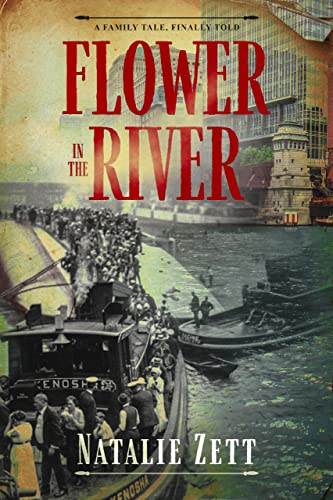Genre:
Historical Fiction
Themes:
Coming of Age
Coming Out
Family Relationships
Ghosts
Historical
Mature Lead 40+
Misfit / Socially Awkward
Nerdy / Geeky
Paranormal Encounters
Quirky Characters
Religion
Supernatural Elements
Heat Level:
None (no sex or physical intimacy at all)
Archetypes:
Computers / IT / Hacker
Reporter / Journalist
Geographic Location:
Continental Europe
United States
Setting:
Afterlife / Underworld
Big City / Urban
Corporation / Office / Workplace
Historical
On the Road / Tour
Small Town / Rural
Sexual / Gender Identity:
Lesbian
Flower in the River
By Natalie Zett
From the depths of a forgotten disaster, unearthing family secrets stirs souls once silenced in history's wake.
Martha Pfeiffer, age 19, was one of 844 persons who perished when a ship chartered for the Western Electric annual picnic capsized in Chicago in 1915. Martha’s surviving family members never recovered from their grief. The Eastland Disaster has been mostly overlooked in recent years.
In 1997, Pearl Pospisil, a retired Chicago writer, and third-generation Pfeiffer, composed a family history and delivered it to her niece, Zara Vrabel, in St. Paul, who was completely unfamiliar with its contents. Pearl had one request: “Do something with this.”
Zara, also a journalist, was cut off from her family and had no interest in genealogy. However, learning of her great-aunt’s death on the Eastland Disaster made Zara’s heart sink.
Zara’s life unravels as she becomes entangled in the plot and realizes that she and her great-aunt shared more than blood. After discovering that the accident was preventable, Zara initially seeks redress. And the release of another Titanic movie poured salt on a fresh wound. So why was the Eastland consigned to oblivion while the Titanic got all the glory?
Flower in the River interweaves the past and present of four generations of an Eastern-European immigrant family. It suggests that even an unknown trauma can affect a family for generations.





